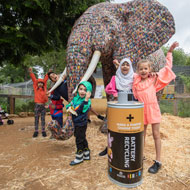
Project to encourage people to reduce landfill waste
A life-sized elephant created from thousands of recycled batteries has gone on display in London to highlight how many are thrown into landfill every year.
Weighing two tonnes, the sculpture was created by artist Tony Diaz and stands at 10-foot-tall. A total of 29,649 batteries were used to create the installation, collected by school children as part of Duracell’s Big Battery Hunt.
The elephant will remain on show at Hanwell Zoo for the duration of the summer where it is hoped to inspire a whole new generation of battery recyclers.
Tony Diaz said: “It’s taken 400 hours and in excess of 29,000 recycled batteries but every moment has been worth it. Creating this elephant has been a humbling reminder that powering change can come from anywhere.
''It is so inspiring to see the younger generation actively involved in making the world a better place and teaching their own parents and loved ones about the importance of recycling.”
More than one million children from across the UK took part in Duracell’s Big Battery Hunt, gathering batteries in their local community and placing them in collection boxes.
Beau-Jensen McCubbin, a spokesman for Hanwell Zoo said: “We are very proud to be the home of the Big Battery Hunt elephant and are very keen to continue to encourage our visitors to reduce landfill waste.
“Our environment is so fragile, and now more than ever we all need to be doing our bit to protect our planet and the incredible biodiversity that calls it home.
“We all have a responsibility to be more sustainable and we are calling on all of our visitors to make a difference by bringing their used batteries along with them on their visit to Hanwell Zoo. We have bins in place to collect all the used batteries you can find.”
Image (C) SWNS Digital.



 The Veterinary Medicines Directorate (VMD) is inviting applications from veterinary students to attend a one-week extramural studies (EMS) placement in July 2026.
The Veterinary Medicines Directorate (VMD) is inviting applications from veterinary students to attend a one-week extramural studies (EMS) placement in July 2026.